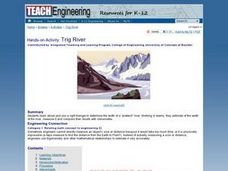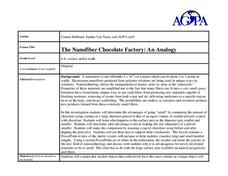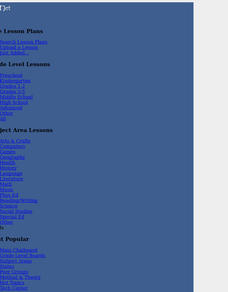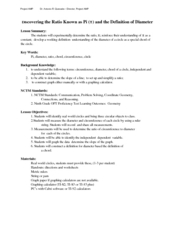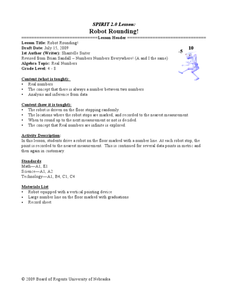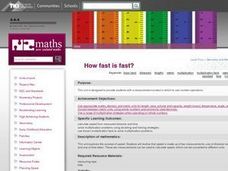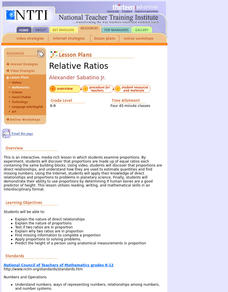Curated OER
By the Pound, Gram Liter or Gallon
Students participate in experiments at five stations to practice measurement. In this measuring lesson, students are presented different produce and objects and must measure with an appropriate tool. Students use metric and customary...
Curated OER
Leaping!
Students properly leap and measure their distance. In this leaping lesson, students practice leaping for accuracy and proper form. Students estimate their leaps and measure with rulers. Students determine distance covered by the entire...
Curated OER
Exploring Area and Perimeter
Two students are blindfolded and each receives a cardboard square, one with pompoms glued around the edge and one with pompoms glued all over the surface. They identify what they feel. The class discusses perimeter and area of polygons....
Curated OER
How Big is a Breath?
Students demonstrate how to use math skills to measure their lung capacity. In this human biology lesson, students use a clear plastic container, measuring cup and rubber balloons to demonstrate how the lungs work. Students estimate the...
Pennsylvania Department of Education
Volume of Compound Figures
Fifth graders use patterns, models and relationships to solve equations. In this equations lesson plan, 5th graders define vocabulary for equations and complete worksheets explaining variables and solving problems.
Curated OER
Trig River
Students calcute distances using trigonometry and angle measurements. They estimate the width of the Trig River, measure it and compare their results with their classmates. They collaborate with a group to research and find the results.
Curated OER
The Nanofiber Chocolate Factory: An Analogy
Students investigate Nanotechnology. In this physic's lesson, students evaluate a hands-on model made from chocolate syrup and pretzels to determine the advantages of size. Students weigh chocolate syrup to determine it's wait...
Curated OER
How big is a whale
Students research the size of whales using print books or the internet. Students do the research in groups. They compare and graph the results.
Curated OER
Discovering The Ratio Pi And The Diameter
Students relate the ratio of Pi to the diameter of a circle. In this geometry lesson plan, students investigate the relationship of the chord of the circle the the number Pi. They define ration, chord, circumference and diameter and find...
Curated OER
Robot Rounding!
Students collect data on a robot and relate the behavior to prove there is an infinite minute set of numbers. In this algebra lesson, students verify that there is always a number between two numbers. They analyze and make inference...
Curated OER
Perimeter
Fifth graders create math word problems. For this geometry lesson, 5th graders define perimeter and discover how to find the perimeter of a rectangle, a square and a regular polygon. Students write word problems on finding the...
Curated OER
Exploring the Properties of Rectangular Prisms.
Students define properties of rectangular prisms. In this geometry lesson, students identify the relationship between two and three dimensional objects. They use Cabri technology to graph their figures.
Curated OER
Exploring Properties of Rectangular Prisms
Learners explore the properties of rectangular prisms. In this geometry lesson, students identify properties of two and three dimensional shapes. They use Cabri technology to create polygons and solve problems.
Curated OER
Capacity
Eighth graders explore the term capacity and understand the word's meaning. They participate in several lab stations set up around the room in which they will estimate how many scoops it will take to fill the container. They then will...
Curated OER
Following a Recipe
Students create a cookbook. For this recipe and writing lesson, students brainstorm the skills necessary to follow a recipe, watch a cooking show and write down a recipe used. Students use a word processing program to write a...
Curated OER
Making It Balance
Students listen to story, "The 100-Pound Problem," compare their weight with character in story, and weigh different classroom items using nonstandard units and standard units. They experiment with different items that can make scale...
Curated OER
How Fast Is Fast?
Students make sensible estimates and check the reasonableness of the answers. Students write and solve problems involving decimal multiplication and division. Students perform calculations with time.
Curated OER
Uniform-Motion Problems: Just Playing with Cars
Students explore the concept of the formula for distance. In this formula for distance lesson plan, students time battery operated cars with constant velocity over 15 meters. Students use the distance = rate x time formula to determine...
Curated OER
Quilt Squared
Students study West Virginia quilts. In this mathematics lesson plan, students use symmetry, geometric shapes, and patterns to create their own quilt square.
Curated OER
Scaling Our School
Fourth graders practice estimating the length and height of buildings at their school. They then compare their estimations with the actual heights or lengths. Each student then builds a scale model using ratio to translate the "real"...
Curated OER
One Size Fits All?
Students describe the differences between an estimate and a guess. They create reasonable estimates based on comparison and activities. Students explain how estimation is helpful in showing the relative size on a scale. They also...
Curated OER
Rep Tiles
Third graders use pattern blocks of one shape at a time to try to create a similar shape. They compare the perimeter of the new figure with the perimeter of the original shape and look for a pattern. Students use the pattern to predict...
Curated OER
Scavenger Hunt
Second graders participate in a Scavenger Hunt to find out how long 1 cm is. They then find 10 objects that estimate to be 1 cm in length and record their findings on the table provided and check their estimates using a ruler.
Curated OER
Relative Ratios
Students discover that proportions are made up of equal ratios each containing the same building blocks. They, using the Internet, apply their knowledge of direct relationships and proportions to problems in planetary science.





